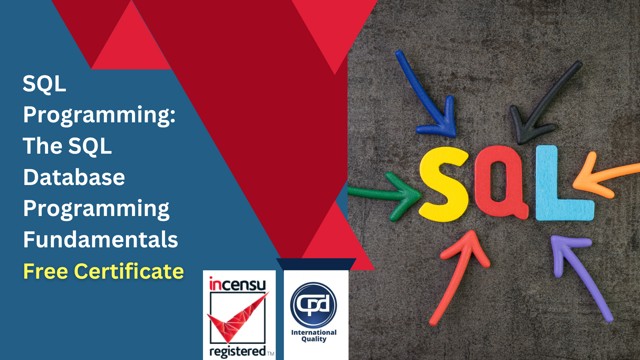Which SQL Learning course is best for you? **

SQL (Structured Query Language), in the current world of data, has become a vital skill for anyone working with data. SQL abilities will allow you to analyse data and uncover useful insights, regardless of whether you're an analyst, developer or business professional. However, with the myriad of SQL courses to choose from, picking the right one for your level of expertise as well as your career goals and personal preferences for learning can be a challenge. This guide will help you navigate through the many SQL courses available and pick the one that best suits your needs.
Why should you learn SQL?
SQL is fundamental to database management. SQL allows users to query and manipulate relational databases. SQL is highly sought-after as more companies rely on data for decision-making. SQL is a valuable tool with a variety of reasons.
Data Managemen:* SQL enables you to retrieve large data sets, update them, and manipulate them with ease.
Career Development:* SQL is a skill that's sought after in many areas, including data analytics, software engineering business intelligence, and data engineering.
*Transferable skills:* SQL is a universal language that can be applied across various platforms.
### Understanding Your Learning Goals
Before you begin exploring course options, consider the goals you'd like to accomplish:
Beginning Level Skills:** A course in SQL will introduce the basics of databases. It will also cover syntax and querying techniques.
Intermediate Skills:If you are already familiar with the fundamentals, taking a class that focuses on subqueries, joins, and functions will assist you in tackling more complicated data-related tasks.
Advanced Competency:*For advanced SQL users advanced classes in optimization, joins complexes and management of databases are the most useful.
What Kinds of SQL Courses Should You Consider?
Here are some of the most popular SQL courses, along including pros and cons, to help determine which aligns best with your goals:
1. **Self-Paced Online Courses**
- **Pros:** The ability to study at your own pace; usually less expensive.
**Cons:** Limited instructor interaction Real-time evaluations may not be available.
*Best for:* Professionals or beginners seeking an enlightening schedule that is flexible.
*Recommended Courses:*
Coursera's "SQL for Data Science An Introduction-level Course" - Covers SQL basics and data wrangling.
- *Udacity’s "SQL for Data Analysis" is a great choice for beginners interested in the applications of data science to SQL.
2. Online courses are taught by an instructor
- **Pros:** 24/7 support from instructors; a structured course with deadlines.
**Cons It requires more commitment in terms of time commitment; it can also be more costly than self-paced courses.
*Best: Students who want organized and guided learning.
*Recommended Courses:*
-- "SQL Essentials for Data Analysis", by edX - This course provides intermediate SQL topics with live support, and includes hands-on projects.
*SQL Server’s "Querying Data With Transact-SQL". It is a great option for people who are focused on Microsoft SQL Server. Includes instructor-led laboratories.
3. **Bootcamps**
*Pros** Intensive & immersive; High accountability & rapid-paced.
*Cons: Time-intensive requirements; typically more expensive.
*Best for:Individuals who require rapidly improve their skills and career changers, or those preparing for a job that requires SQL.

*Recommended Bootcamps:*
- DataCamp's "Data analyst using SQL"* An extensive course that covers everything from the basics to advanced SQL.
General Assembly's SQL Bootcamp* - A brief and hands-on bootcamp that covers the fundamental SQL concepts and use scenarios.
4. **Certification Programs**
- **Pros**: Offers certifications and training that can lead to industry-approved credentials.
*Cons** Longer duration More structured and focused on the exam.
*Best for:* Professionals who want to validate their SQL expertise with a reputable certification.
*Recommended Certifications:*
Microsoft certified Azure Data Foundations* – It focuses on SQL within Microsoft Azure environment.
DB2 SQL Essentials - IBM Certified Database Associate The perfect course for IBM environments. Basic SQL and database concepts.
### Specialized SQL Training Courses for Career Paths
Data Analytics: Courses that emphasize the visualization of data, data manipulation and data analysis are great for aspiring analyst.
- **Database Administration": Advanced SQL courses which delve into the depths of the indexing of databases, security and optimization.
- **Software development:** Courses that focus on SQL integration and application programming are ideal especially in cloud-based environments.
### Tip For Choosing The Right Course
1. **Assess your Current Skill Level** If you're just an absolute beginner, start by taking a basic course. Intermediate learners should think about a SQL topic or a specialization.
2. Consider investigate this site of the Course **Self-paced is best for flexibility. Courses that are led by instructors are best to guide students. Bootcamps provide a quick immersion.
3. Look for applications that are practical Find courses that provide exercises or projects that allow you to apply actual SQL scenarios.
4. Read what past students had to say about the course's content, instructors and general experience.
### # Conclusion
You can enhance your career opportunities by selecting the right SQL education course. If you're looking to learn the basics of SQL or developing your expertise, there are courses available that can assist. Find the right course and begin mastering SQL today.
